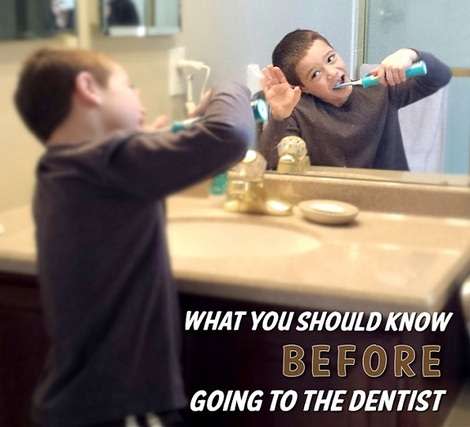10 Things You Should Know Before Going to the Dentist

One of my closest friendsis adentist. When we are out together and meet new people, she does not always reveal that she dentist. The reason for this is that she is a kindhearted, approachable person, and whenever she reveals her vocation, folks inevitably wind up asking her questions about their teeth. It happens at restaurants, in stores, and even at the gym. I have witnessed it happen several times. One of the challenges in her industry is to get people to not dread their dental appointments, so that they will prefer to ask questions in the office rather than on the street.
Growing up, my uncle was a dentist, so those regular dental appointments never made me nervous or tentative. (The eye doctor, on the other hand, is a whole other story.) For my kids the dentist is more of a novelty than a chore, but many children do not feel the same way. My 10-year-old has always taken more time to brush and care for his teeth, while my youngest requires more parental intervention to make sure he is brushing before bed. To alleviate any concerns, he uses arechargeable electric toothbrush for kids. Brushing is more fun for him now, so he is more likely to stick with it and keep his teeth clean. I don't want his view of the dentist to change from novelty to fear.
Fortunately for parents and kids, there are ways to make the dentist appointment less stressful for everyone.Here are 10 things to know before visiting the dentist:
1. Find a dentist that suits you and your family.Seek recommendations or look online for reviews. Call ahead to ask if you can interview or speak with the dentist about any reservations you may have regarding your dentist appointment. If you are taking a child to the dentist, consider using a pediatric dentist.
2. Gather your dental records, x-rays, insurance information, and any other pertinent papers to bring with you to your appointment. If this is a child's first appointment, consider letting them hand their records to the dentist themselves.
3. Know your water.Find out if your drinking water contains fluoride. If not, your doctor may suggest that you and your child use a fluoride mouth rinse in addition to regular brushing and flossing.
Related: How to choose a doctor as your primary care physician
4. Write down any questions you may have, so you do not forget to leave without the answers you need. When taking children to their dentist appointment, encourage them to ask any questions they may have too.
5. Talk with your childrenabout what they can expect to happen during their visit. Describe how their teeth will be cleaned and the dentist will check for cavities. Explaining the procedure beforehand may help to ease any nervousness and help them to feel more confident during their appointment.
6. Talk with your dentist.If your child is nervous about the visit, let your dentist and hygienist know. Some children may be nervous, while others may have difficulty sitting still, or even sensitivities to lights and sounds. Talk with the dental office beforehand to make sure they can accommodate your needs.
7. Practice full disclosurewith both the dentist and the hygienist. It will be helpful to tell them about any health issues, even if you may not think it would be a concern during a regular dental appointment. Let the office know if there is a chance that you may be pregnant, if you or your child have any allergies (particularly to latex or medications), bleeding or clotting problems, or any other health issues. Women who are pregnant or nursing may need to avoid x-rays and certain dental procedures.
8. Request your favorite hygienist.If you find a hygienist who you or child respond well to, ask for that person's name and have it added to your file. That way you can request that same hygienist for your next visit.
9. Remember to schedule your next appointment!(This is one sin that I am super guilty of committing, and then before I know it, too much time has passed between appointments.) Dental exams are not merely to check for cavities. Your dentist will be looking for signs of decay, gum disease, and even oral cancer, so do not skip an appointment simply because you or your child are not having any pain.
10. Keepproper dental caregoing all year long.According to theCDC, tooth decay affects children in the United States more than any other chronic infectious disease. Keep up withregular dental care, including brushing twice daily, flossing, and eating a healthy diet. You should also speak with your dentist about whether or not your child should be using a flouride mouth rinse. Encourage your children to take care of their teeth so they can avoid any issues in the future. The better you and your children care for your teeth between appointments, the more likely your appointments are to go smoothly.
Photo source: EatSleepBe.com
-By Jessica Cohen
For 6 great strategies to prepare your child for seeing the dentist, visit Babble!
MORE ON BABBLE
10 tricks to combat a bad mood
8 little ways you're sabotaging your diet
10 ways to be a happier person for life

